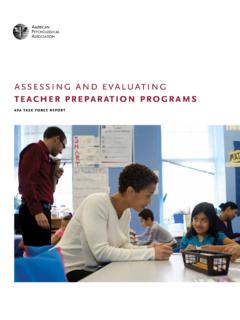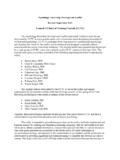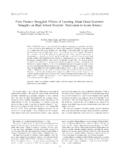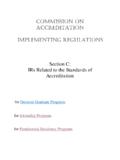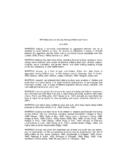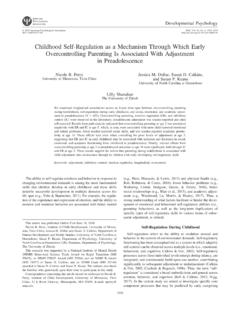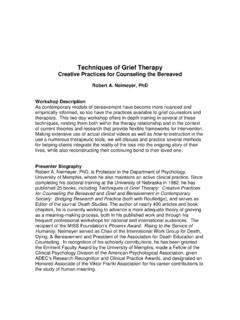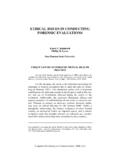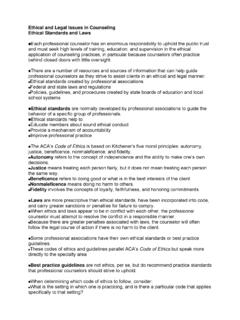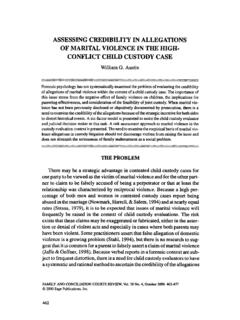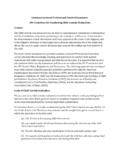Transcription of Guidelines for Child Custody Evaluations in Family …
1 Guidelines for Child Custody Evaluations in FamilyLaw ProceedingsAmerican psychological AssociationIntroductionFamily law proceedings encompass a broad range of issues,including Custody , maintenance, support, valuation, visita-tion, relocation, and termination of parental rights. Thefollowing Guidelines address what are commonly termedchild custodyevaluations, involving disputes over decisionmaking, caretaking, and access in the wake of marital orother relationship dissolution. The goal of these guidelinesis to promote proficiency in the conduct of these particularevaluations. This narrowed focus means that evaluationsoccurring in other contexts ( , Child protection matters)are not covered by these Guidelines . In addition, the guide-lines acknowledge a clear distinction between the forensicevaluations described in this document and the advice andsupport that psychologists provide to families, children,and adults in the normal course of psychotherapy some states have begun to favor such termsasparenting plan, parenting time,orparental rights andresponsibilitiesover the termcustody( american Law In-stitute, 2000, pp.)
2 131 132), the substantial majority of legalauthorities and scientific treatises still refer tocustodywhenaddressing the resolution of decision-making, caretaking,and access disputes. In order to avoid confusion and toensure that these Guidelines are utilized as widely as pos-sible, these Guidelines apply the termcustodyto theseissues generically, unless otherwise specified. It is nolonger the default assumption that Child Custody proceed-ings will produce the classic paradigm of sole custodianversus visiting parent. Many states recognize some form ofjoint or shared Custody that affirms the decision-makingand caretaking status of more than one adult. The legalsystem also recognizes that the disputes in question are notexclusively marital and therefore may not involve divorceper se. Some parents may never have been married andperhaps may never even have lived together. In addition, Child Custody disputes may arise after years of successfulco-parenting when one parent seeks to relocate for work-related or other reasons.
3 These Guidelines apply the termparentsgenerically when referring to persons who seeklegal recognition as sole or shared may have numerous resources at their dis-posal, including psychotherapy, counseling, consultation,mediation, and other forms of conflict resolution. Whenparents agree to a Child Custody arrangement on theirown as they do in the overwhelming majority (90%) ofcases (Melton, Petrila, Poythress, & Slobogin, 2007) there may be no dispute for the court to decide. However,if parties are unable to reach such an agreement, the courtmust intervene in order to allocate decision making, care-taking, and access, typically applying a best interests ofthe Child standard in determining this restructuring ofrights and responsibilities (Artis, 2004; Elrod, 2006; Kelly,1997).Psychologists render a valuable service when theyprovide competent and impartial opinions with direct rel-evance to the psychological best interests of the Child (Miller, 2002).
4 The specific nature of psychologists in-volvement and the potential for misuse of their influencehave been the subject of ongoing debate (Grisso, 1990,2005; Krauss & Sales, 1999, 2000; Melton et al., 2007).The acceptance and thus the overall utility of psycholo-gists Child Custody Evaluations are augmented by demon-strably competent forensic practice and by consistent ad-herence to codified ethical Guidelines are informed by the american Psy-chological association s (APA s) Ethical Principles ofPsychologists and Code of Conduct (hereinafter referredto as the Ethics Code; APA, 2002). The termguidelinesrefers to statements that suggest or recommend specificprofessional behavior, endeavors, or conduct for psychol-This revision of the 1994 Guidelines for Child Custody Evaluations inDivorce Proceedings ( american psychological association , 1994) wascompleted by the Committee on Professional Practice and Standards(COPPS) and approved as APA policy by the APA Council of Represen-tatives on February 21, 2009.
5 Members of COPPS during the developmentof this document were Lisa Drago Piechowski (chair, 2009), Eric (chair, 2007 2008), Mary A. Connell (chair, 2006), Nabil El-Ghoroury (Board of Professional Affairs [BPA] liaison, 2007 2008),Michele Galietta, Terry S. W. Gock, Larry C. James (BPA liaison,2004 2006), Robert Kinscherff, Stephen J. Lally, Gary D. Lovejoy, MaryAnn McCabe, Bonnie J. Spring, and Carolyn M. West. COPPS is gratefulfor the support and guidance of the BPA and particularly to BPA ChairsCynthia A. Sturm (2009), Jaquelyn Liss Resnick (2008), Jennifer F. Kelly(2007), and Kristin Hancock (2006). COPPS also acknowledges theconsultation of APA Practice Directorate staff Shirley A. Higuchi andAlan Nessman. COPPS extends its appreciation to the APA PracticeDirectorate staff who facilitated both the work of COPPS and the revisionefforts: Lynn F. Bufka, Mary G. Hardiman, Omar Rehman, Geoffrey , Laura Kay-Roth, Ernestine Penniman, and Ayobodun : These Guidelines are scheduled to expire 10 years fromFebruary 21, 2009 (the date of their adoption by the APA Council ofRepresentatives).
6 After this date, users are encouraged to contact the APAP ractice Directorate to determine whether this document remains in concerning this article should be addressed to thePractice Directorate, american psychological association , 750 FirstStreet, NE, Washington, DC 2010 american Psychologist 2010 american psychological association 0003-066X/10/$ 65, No. 9, 863 867 DOI: Guidelines differ fromstandardsin that standardsare mandatory and may be accompanied by an enforcementmechanism. Guidelines are aspirational in intent. They areintended to facilitate the continued systematic developmentof the profession and to help facilitate a high level ofpractice by psychologists. Guidelines are not intended to bemandatory or exhaustive and may not be applicable toevery professional situation. They are not definitive, andthey are not intended to take precedence over the judgmentof Orienting Guidelines : Purpose ofthe Child Custody Evaluation1.
7 The purpose of the evaluation is to assistin determining the psychological bestinterests of the extensive clinical training of psy-chologists equips them to investigate a substantial array ofconditions, statuses, and capacities. When conducting childcustody Evaluations , psychologists are expected to focus onfactors that pertain specifically to the psychological bestinterests of the Child , because the court will draw uponthese considerations in order to reach its own conclusionsand render a strive to identify thepsychological best interests of the Child . To this end, theyare encouraged to weigh and incorporate such overlappingfactors as Family dynamics and interactions; cultural andenvironmental variables; relevant challenges and aptitudesfor all examined parties; and the Child s educational, phys-ical, and psychological The Child s welfare is seek to maintain an ap-propriate degree of respect for and understanding of par-ents practical and personal concerns; however, psycholo-gists are mindful that such considerations are ultimatelysecondary to the welfare of the and other parties are likelyto advance their concerns in a forceful and contentiousmanner.
8 A primary focus on the Child s needs is enhancedby identifying and stating appropriate boundaries and pri-orities at the outset of the evaluation . Psychologists maywish to reflect upon their own attitudes and functioning atvarious points during the course of the evaluation to ensurethat they are continuing to maintain an optimal focus on thechild s The evaluation focuses upon parentingattributes, the Child s psychological needs,and the resulting the court s perspective, themost valuable contributions of psychologists are those thatreflect a clinically astute and scientifically sound approachto legally relevant issues. Issues that are central to thecourt s ultimate decision-making obligations include par-enting attributes, the Child s psychological needs, and theresulting fit. The training of psychologists provides themwith unique skills and qualifications to address these attempt to providethe court with information specifically germane to its rolein apportioning decision making, caretaking, and most useful and influential Evaluations focus uponskills, deficits, values, and tendencies relevant to parentingattributes and a Child s psychological needs.
9 Comparativelylittle weight is afforded to Evaluations that offer a generalpersonality assessment without attempting to place resultsin the appropriate context. Useful contextual considerationsmay include the availability and use of effective treatment,the augmentation of parenting attributes through the effortsof supplemental caregivers, and other factors that couldaffect the potential impact of a clinical condition General Guidelines : Preparing forthe Custody Evaluation4. Psychologists strive to gain and maintainspecialized change, existing methods arerefined, and new techniques are identified. In Child custodyevaluations, general competence in the clinical assessmentof children, adults, and families is necessary but is insuf-ficient in and of itself. The court will expect psychologiststo demonstrate a level of expertise that reflects contextualinsight and forensic integration as well as testing andinterview continuously striveto augment their existing skills and abilities, consistentwith a career-long dedication to professional psychologists take care to acquire sufficientknowledge, skill, experience, training, and education priorto conducting a Child Custody evaluation , this acquisition isnever complete.
10 An evolving and up-to-date understandingof Child and Family development, Child and Family psycho-pathology, the impact of relationship dissolution on chil-dren, and the specialized Child Custody literature is criticalto sustaining competent practice in this area. Psychologistsalso strive to remain familiar with applicable legal andregulatory standards, including laws governing Child cus-tody adjudication in the relevant state or other complex issues arise that are outside psychologists scope of expertise, they seek to obtain the consultation andsupervision necessary to address such Psychologists strive to function asimpartial law cases involve complexand emotionally charged disputes over highly personalmatters, and the parties are often deeply invested in aspecific outcome. The volatility of this situation is oftenexacerbated by a growing realization that there may be noresolution that will completely satisfy every person in-volved.
